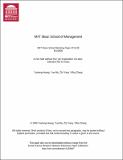A Fire Sale without Fire: An Explanation of Labor-Intensive FDI in China
Author(s)
Zhang, Yifan; Yang, Zhi; Ma, Yue; Huang, Yasheng
Downloadfiresale.pdf (398.8Kb)
Metadata
Show full item recordAbstract
Using a large firm-level panel dataset from the Chinese National Bureau of Statistics, we examine the effect of financial distortions on FDI inflows in China's labor-intensive industries. Following Whited and Wu (2006), we estimate the investment Euler equation and construct a financing constraint index for each firm. We find that among domestic firms, the financing constraint index is highest for private firms and lowest for state-owned firms. This finding is consistent with the political pecking order hypothesis that states that there is a severe lending bias in China's financial system against private firms in favor of state-owned enterprises. Then we estimate a probit model of joint-venture decisions by private firms. We show that firms with greater financing constraints are more likely to be acquired and controlled by foreign firms. We interpret this evidence to be consistent with the fire-sale hypothesis that states that private firms relinquish their equity and control to foreign investors in order to raise financing for growth. We find that those firms in the top 25 percent of the most financing constraints could have avoided losing 31.5 percent of the equity share to foreigners had they faced the same favorable financing constraints as a typical firm in Zhejiang Province.
Date issued
2008-08-01Publisher
Cambridge, MA; Alfred P. Sloan School of Management, Massachusetts Institute of Technology
Series/Report no.
MIT Sloan Working Papers Series;4713-08
Keywords
Fire Sale, China, FDI